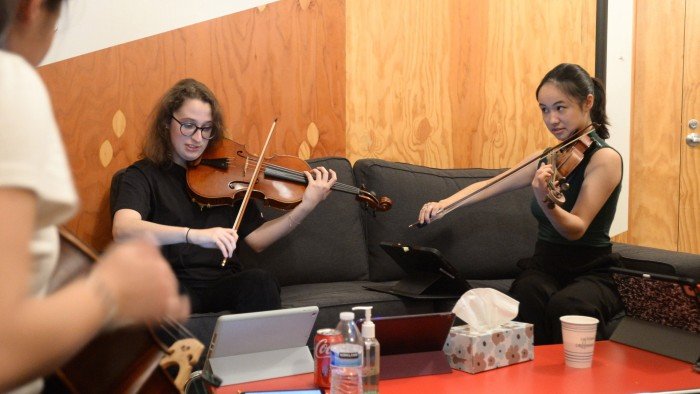Unlock the Editor’s Digest for free
Roula Khalaf, Editor of the FT, selects her favourite stories in this weekly newsletter.
In a sun-drenched classroom in the Juilliard performing arts conservatory in Manhattan, a group of students has gathered for a lesson that might seem more at home in one of New York’s multiple business schools.
While the sounds of pianos, violins and singers echo down the corridor as young musicians focus on musical notes, 20 first-year dance students are attending a class that focuses instead on numbers.
They are learning principles of entrepreneurship and design thinking, and split into groups to discuss their assignment for the day: creating the vision and mission of an organisation they would like to create; and then applying basic budgeting skills as they explore how to help fund their project with a gala.
Alice Jones, assistant dean of community engagement and career services, describes their budget as “a blueprint for your project — a plan for where your money will go rather than wondering where it went”.
She breaks down the different revenues and expenses by category, and asks the class “how can you balance them if your expenses are more than your income?” She talks them through costs from venue hire to “green room” snacks and insurance; and in-kind as well as earned income.
Over the past decade, the course has been part of a broader range of initiatives supported by Juilliard’s Alan D Marks Center, including seed funding for student projects, fellowships, job placements and life-long careers advice for hundreds of past and present students each year.

They learn how to talk to clients, negotiate, draft a contract and plan for the future, and can sign up for other classes during their studies including Leadership and Innovation in the Arts, the Musician as Entrepreneur, A Career in Music, Jazz Business I and II. They also learn broader practical skills during their studies including stagecraft and lighting.
The training is one response to the challenges facing performers at a time of reduced public funding and rising job insecurity. It seeks to compensate for a broader pattern in the arts highlighted by a recent survey of arts alumni, showing the biggest gap between skills acquired and those needed in paid work is for business, financial, or entrepreneurial skills.
Damian Woetzel, Juilliard’s president and a former principal dancer with the New York City Ballet, who himself became a choreographer before moving into arts management, says: “Young people need to understand both the artistic and the business sides of their work in order to be successful and to be able to make choices as their careers develop.
“We prepare students not only to be world-class artists but to be adaptable and entrepreneurial. That means teaching them how to build sustainable careers, including understanding contracts, managing finances, navigating freelance work and more, to create opportunities over the long term.”
Given the difficulties of students pursuing their artistic passions in study and in practice when faced with substantial educational debts in the US, Juilliard recently also launched in parallel a fundraising campaign with the aim of making its training tuition free.
“By removing the financial barriers, we empower students to take creative risks, pursue their ideas, serve their communities, and shape careers that reflect their full artistic potential,” says Woetzel. “This initiative is not just about affordability; it’s about ensuring that talent, ambition and choices are never constrained by economics.”

While many of the academy’s graduates in music and drama may be able to pursue their first passion for performance for much of their working lives, the difficulties of pursuing their art come earlier for most dancers as their bodies become less flexible.
In the Essentials of Entrepreneurship in the Arts class, part of a semester-long series that includes discussions with successful graduates sharing their experiences, one student says: “I know I’m going to stop performing when my body gives out.”
Nigel Campbell, a Juilliard dance graduate on the faculty who also teaches the class, says individual passions can broaden, too: “You might not change but expand. When you are 35 years old, you don’t fall off a cliff. You can teach, choreograph, pursue other avenues. They are not a consolation prize.”
James Street, a student in the class who spends most of his time focused on dance, is already being encouraged to think about what happens in his post-performance life.
Street has applied for a grant to launch a dance component in an annual music festival on Wolf Island, Ontario, where he grew up. “I want to bring dance to a rural community,” he says.
He welcomes Juilliard’s broader commercial training beyond dance. “We’re not just pursuing our artistic passions, but how we will fit into a commercial world. You need to have a plan,” he says.




No Comment! Be the first one.